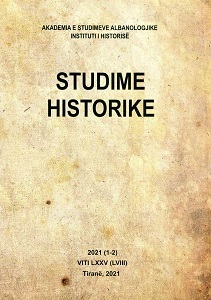KOSOVA NË KRYQËZIM GJEOPOLITIK: SHQIPËRIA, JUGOSLLAVIA DHE FUQITË E MËDHA 1945-1948
KOSOVO IN THE GEOPOLITICAL CROSSROADS: ALBANIA, YOUGOSLAVIA AND THE GREAT POWERS 1945-1948
Author(s): Hamit KabaSubject(s): Diplomatic history, Political history, Social history, WW II and following years (1940 - 1949), Geopolitics
Published by: Qendra e Studimeve Albanologjike
Keywords: Kosovo; Yugoslavia; Albania; BS; USA; Great Britain; Tito; Enver Hoxha; Stalin; the relationship;
Summary/Abstract: Since the fall of communism, the issue of the Albanian Labor Party’s stance toward the question of Kosovo has been hotly debated both in Albanian academia and public discourse. Fueled either by nationalism and lack of historical knowledge many historians, depending on their ideological or political affiliation have speculated on why the Albanian Government did not present its claims on Kosovo, at the Paris Peace Conference of 1946. By using archival sources of different provenance, the article “Kosovo in Geopolitical Crossroads: Albania, Yugoslavia and the Great Powers 1945-1948” intervenes within this controversial debate with the aim of shedding more light on it. The introduction of this study explains the different competing narratives that circulate today and, approaching the whole matter from a counterfactual standpoint, it tries to define whether or not the Albanian communists did have chances to successfully claim Kosovo in the international forums that established the postwar European order. Afterwards, the article expounds the argument in two main parts. Its first part deals 1) with the forced union of Kosovo with the Federal Republic of Yugoslavia; 2) with the attitudes of Albania, Soviet Union, USA, and Great Britain on the issue of Kosovo, in the period January 1945-June 1946. The article argues that the problem of Kosovo did not become part of an international agenda. The powers of the Antifascist Alliance did consider the question of Kosovo an internal matter of Yugoslavia and left its “official solution” in the hands of the two concerned parties: the Communist Party of Yugoslavia (CPY) and Communist Party of Albania (CPA). The secondpart of the article focuses on the problem of Kosovo in the period June 1946-June 1948. During these two years, the relations between the two communist parties moved from that of extremely close friendship to their unraveling and total break. After the conclusion of the Paris Peace Conference, the Albanian and Yugoslav leadership envisioned that the Kosovo question would be solved within the framework of the Balkan Federation, which Tito and his close associates in the CPY top-echelons were pushing forward. Initially, Stalin supported the project but later, the Soviet dictator hindered its implementation. In the course of 1947 and early 1948, the head of the Kremlin came to distrust the hegemonic ambitions of Yugoslavia in the Balkans and especially in Albania. What exacerbated Stalin’s suspicion was especially Tito’s independent policy towards the USSR and CPY’s involvement in the Greek civil war while the armed conflict with the West was looming closer in the horizon. After the Tito-Stalin split, the ALP’s leadership nurtured the illusory hope that after the regime change in Belgrade, Stalin would approve the territorial integration of Kosovo within the Albanian state. However, Stalin rejected Enver Hoxha's proposal in 1949 for a potential border change. After that, this issue was ’archived’. This article is based on Albanian, Yugoslav, Russian, American, and British sources, as well as some important recent publications. Unlike most previous studies, this study approaches the Kosovo question not only from the narrow and local perspectives of the interested parties, i.e. Yugoslavia and Albania, but also from the broader angle ofthe Great Powers.
Journal: Studime Historike
- Issue Year: 2021
- Issue No: 01-02
- Page Range: 229-259
- Page Count: 31
- Language: Albanian
- Content File-PDF

